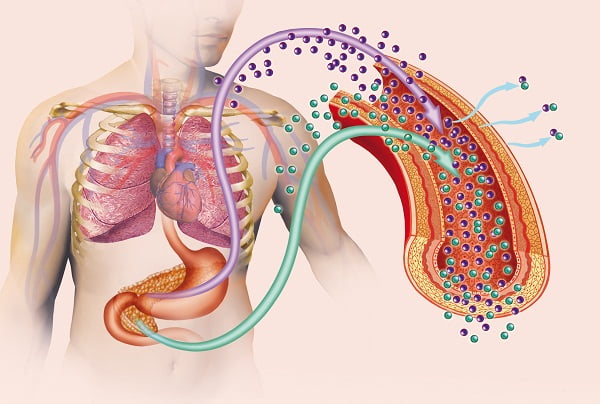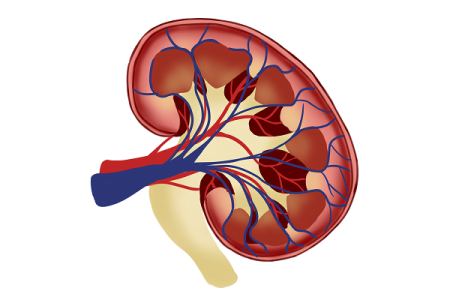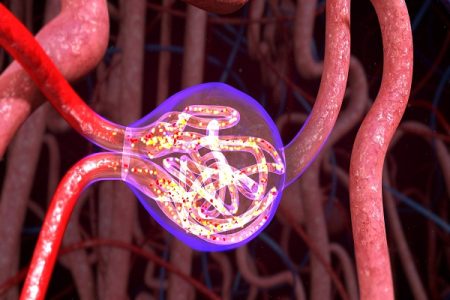What Are the Causes and Risk Factors for Chronic Kidney Disease?
- Updated on: Jun 12, 2024
- 3 min Read
- Published on Feb 21, 2021


Causes of Chronic Kidney Disease
Each kidney in our body contains about 1 million filtering units. These are called nephrons. Any disease that injures these nephrons can cause kidney disease. Chronic Kidney Disease (CKD) is not a single disease. Diabetes and high blood pressure can both damage your nephrons and are the most important causes of CKD.
High blood pressure can damage the blood vessels of your kidneys, heart, and brain too. The kidneys contain lots of blood vessels and any blood vessel disease is generally dangerous to our kidneys. Autoimmune diseases such as lupus have the potential to cause damage to the blood vessels and can make antibodies against kidney tissues leading to its damage.
There are various other causes of CKD such as polycystic kidney disease, glomerulonephritis, streptococcal infection, etc.
Risk Factors for Chronic Kidney Disease
In the majority of cases, progressive kidney damage can occur due to various factors. Several risk factors can contribute to the damage of the kidneys and development of the CKD. The risk of CKD increases after the age of 65 years. The condition also runs in families. The disease is more common among African Americans, Native Americans, and Asian Americans. The risk factors for the Chronic Kidney Disease are listed below.
Diabetes – chronic kidney disease is linked to diabetes. On the off chance that the patient’s diabetes is not all around controlled, an overabundance of sugar (glucose) can aggregate in the blood. Kidney ailment is not regular amid the initial 10 years of diabetes; it all the more ordinarily happens 15-25 years after diagnosis of diabetes.
Hypertension (high blood pressure) – high blood pressure can damage the glomeruli – parts of the kidney that are involved in filtering waste products.
Obstructed urine flow – if urine flow is obstructed, it can back up into the kidney from the bladder (vesicoureteral reflux). A blocked urine stream expands weight on the kidneys and undermines their capacity. Conceivable causes incorporate a developed prostate, kidney stones, or a tumor.
Hereditary & genetic factors- Polycystic kidney
Kidney artery stenosis – the renal artery narrows or is blocked before it enters the kidney.
Fetal developmental problem – if the kidneys do not develop properly in the unborn baby while it is developing in the womb, it can cause kidney disease.
Systemic lupus erythematosus – it is an autoimmune disease. Our body’s immune system attacks the kidneys as though they were foreign tissue.
Malaria and yellow fever – it is known to cause impaired kidney function.
Certain medications – overuse of, for example, NSAIDs (non-steroidal anti-inflammatory drugs), such as aspirin or ibuprofen can cause CKD.
Illegal substance abuse – such as heroin or cocaine.
Obesity, hypercholesterolemia
Injury – a sharp blow or physical injury to the kidney(s) can also be fatal for kidneys
Certain toxins, metals – including fuels, solvents, (for example, carbon tetrachloride), and lead (and toxic paint, pipes, and patching materials) can contribute to the development of CKD. Indeed, even a few sorts of gems/jewelry have poisons, which can prompt perpetual kidney illness.
- cigarette smoking
- high cholesterol
- bladder obstruction caused by benign prostatic hyperplasia
- cirrhosis and liver failure
- bladder cancer
- kidney cancer
- kidney stones
- kidney infection
- scleroderma
- vasculitis
FAQs
Can dehydration lead to chronic kidney disease?
Chronic dehydration strains the kidneys, potentially contributing to CKD. Staying adequately hydrated is crucial for kidney health and overall well-being.
Does age play a role in the development of chronic kidney disease?
Age is a risk factor, and kidney function tends to decline with age. Regular health check-ups become more critical as individuals age to monitor kidney health.
Can infections contribute to chronic kidney disease?
Yes, untreated infections, especially urinary tract infections, can lead to kidney damage. Prompt treatment of infections is essential to prevent complications.
How does smoking impact the risk of chronic kidney disease?
Smoking increases the risk of CKD by damaging blood vessels and reducing blood flow to the kidneys. Quitting smoking is a crucial step in kidney disease prevention.
Are there genetic factors that increase the risk of chronic kidney disease?
Yes, genetic factors can predispose individuals to CKD. Understanding family history and regular health screenings are important for those with a family history of kidney issues.












